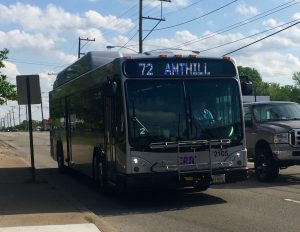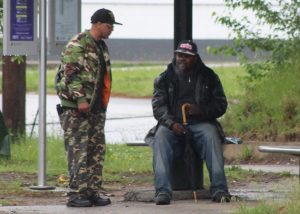By Thess Pfferr and Brooke Warner
You might not notice them at first: The dozens of people who pick their way along paths worn in the grass and rocky ground along Jefferson Davis Highway as traffic zooms past. If you look closely, you’ll see that many are carrying bags of groceries, schoolbooks, or tools of a trade. These are working families, and they’re not out for exercise: There is no public transportation in southern Jefferson Davis.
The area’s decline really began in the early 1960s, when Interstate 95 opened, allowing drivers to bypass the Corridor altogether. That drove local small businesses, truck stops, motels and restaurants out of business. When the money moved out, poverty moved in. By the 1980s, Jeff Davis was known for its junkies, prostitution and social decay, and was generally avoided by travelers and businesses.
Now, the nearest full-service grocery store is a Food Lion nearly a mile from the heart of Jeff Davis. Many residents without cars must undertake a dangerous journey on foot to get there. It is too dangerous to even ride a bike since there are few sidewalks in the area. The nearest bus stop is about 30 minutes away on foot.
Maria G., an immigrant from Mexico living in Jeff Davis, has access to a car, but many others are not so fortunate.
“I drive, but I’ve seen people who don’t know how or are scared [of being pulled over undocumented],” she said. “They have to walk or pay someone to drive them to the bus.”
“I also see moms who, to get to church, have to walk and cross the Jefferson [Davis Highway] and [Route] 150, which are especially dangerous in the snow or rain,” Maria said. “There are also older people, Americans, retired, who don’t drive and have to cross the street to do laundry. It’s very dangerous.”
Addressing the public safety issue has galvanized people here like nothing else. Members of the community — Hispanic, African American, and white — met with members of the Chesterfield County government and the Sacred Heart Church who made a site visit to Jeff Davis.
“It was important for us, the Hispanics, to work with the American people,” she said. “We began to share the needs that exist in the area where we all live.”
Leaders of the community, including Maria and representatives of the Jefferson Davis Association, met with the Chesterfield County Board of Supervisors to air their concerns. They argued for a safer environment for their kids and better access to transportation for everyone. Citing budget limitations, the County rejected new spending for transportation infrastructure, but did place several benches along Jefferson Davis Highway.
The idea was that people from the community could rest as they walked to the bus.
Listen to the rumbling of cars as they pass the bus stop.


